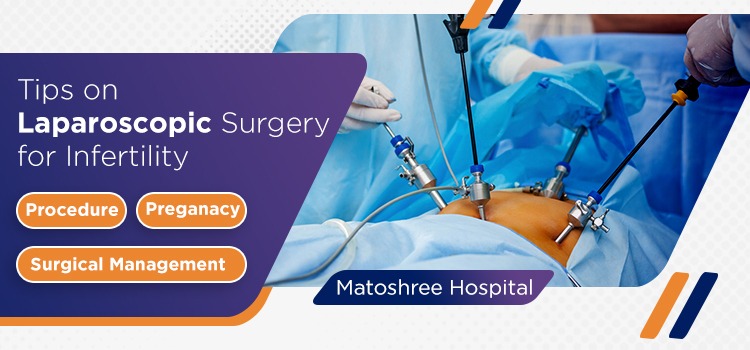Tips on Laparoscopic Surgery for Infertility

Welcome to our comprehensive guide on laparoscopic surgery for infertility, a minimally invasive procedure that has revolutionized the field of reproductive medicine. As subject matter experts in the field, we are confident in providing you with valuable insights on this topic. In this blog, we will delve into the what, when, and why of laparoscopic surgery for infertility, discussing its benefits, potential risks, and its role in the surgical management of female infertility. Let's get started!
What is Laparoscopic Surgery for Infertility?
During the laparoscopic procedure for infertility, a tiny camera called a laparoscope is inserted through a small incision in the abdominal wall. This camera provides a clear view of the pelvic organs, allowing the surgeon to identify any abnormalities and assess factors related to laparoscopic surgery cost. In the context of infertility, laparoscopy is performed to diagnose and treat underlying conditions that may be preventing conception.During the laparoscopic procedure for infertility, a tiny camera called a laparoscope is inserted through a small incision in the abdominal wall. This camera provides a clear view of the pelvic organs, allowing the surgeon to identify any abnormalities. Additional small incisions may be made to introduce surgical instruments for treatment if necessary.
When is Laparoscopy IVF Recommended?
Laparoscopy IVF, which combines laparoscopic surgery with in vitro fertilization (IVF), is recommended in various situations, including:
- Unexplained Infertility: When conventional fertility tests do not identify the cause of infertility, laparoscopy can help identify underlying issues such as endometriosis, adhesions, or pelvic inflammatory disease.
- Endometriosis:Laparoscopy is an effective way to diagnose and treat endometriosis, a condition where endometrial tissue grows outside the uterus, causing pain and infertility.
- Ovarian Cysts: Large or persistent ovarian cysts that affect fertility may require surgical removal through laparoscopy.
- Fallopian Tube Blockage: If there are suspected blockages or abnormalities in the fallopian tubes, laparoscopy can help assess the extent of the problem and, if possible, remove obstructions.
- Uterine Fibroids:Laparoscopic myomectomy can be performed to remove uterine fibroids that may interfere with pregnancy.
Benefits of Laparoscopic Surgery for Successful Pregnancy:
Laparoscopic surgery for infertility offers several advantages over traditional open surgery, making it an attractive option for many patients. Some of the key benefits include:
- Minimal Scarring: The small incisions used in laparoscopy result in minimal scarring, reducing the risk of post-surgery complications and promoting faster healing.
- Shorter Recovery Time: Compared to open surgery, laparoscopic procedures generally require a shorter recovery period, allowing patients to resume normal activities sooner.
- Lower Infection Risk: With smaller incisions, the risk of infection is significantly reduced, enhancing the overall safety of the procedure.
- More Accurate Diagnosis: Laparoscopy provides a detailed and magnified view of the pelvic organs, enabling surgeons to diagnose subtle abnormalities that might be missed in traditional imaging tests.
- Increased Pregnancy Success: By treating underlying conditions that hinder pregnancy, laparoscopy can significantly increase the chances of successful conception and healthy pregnancy.
Risks Involved in Laparoscopy Procedure
Laparoscopic surgery for infertility is considered a safe and effective procedure, and while it is important to be aware of potential complications, rest assured that they are relatively rare. Here are some aspects to keep in mind when considering the risks involved in laparoscopy:
- Infection: The risk of infection is lower with laparoscopy, and medical professionals take appropriate measures to prevent it.
- Bleeding: While excessive bleeding is a possibility, it is essential to remember that medical teams are well-prepared to handle any such situation with prompt and appropriate interventions.
- Organ Injury: Although it is a rare occurrence, it is comforting to know that laparoscopic surgeons are highly trained and take utmost care to avoid any accidental injury to nearby organs.
- Anaesthesia-related Risks: Complications related to anaesthesia are infrequent, and an experienced anaesthesia team ensures your safety and comfort throughout the procedure.
- Deep Vein Thrombosis (DVT): To minimize the risk of DVT, the medical team takes measures to encourage movement during the procedure and provide appropriate post-operative care.
- Shoulder Pain: Some patients may experience temporary shoulder pain due to the carbon dioxide used to inflate the abdomen during the procedure. However, this discomfort is typically short-lived and easily manageable.
- Remember that laparoscopic surgery has transformed the way infertility is treated, providing numerous benefits and improved outcomes for patients. The risks associated with laparoscopy are carefully managed by skilled medical professionals, making it a safe and viable option for those seeking fertility treatment.
- Always consult with a qualified fertility specialist to understand your individual case and make informed decisions for your reproductive journey. Your dreams of starting a family can become a reality with the help of laparoscopic surgery and the dedicated support of your healthcare team.
Surgical Management of Infertility in Women:
Laparoscopic surgery plays a crucial role in the surgical management of female infertility. Depending on the underlying condition, different procedures can be performed:
- Endometriosis Excision: In cases of endometriosis, laparoscopy allows the surgeon to excise or remove abnormal tissue growths, providing relief from pain and improving fertility.
- Ovarian Cystectomy: Large or persistent ovarian cysts can interfere with ovulation and fertility. Laparoscopic cystectomy involves removing the cyst while preserving the healthy ovarian tissue.
- Fallopian Tube Surgery: Laparoscopy can be used to repair or unblock fallopian tubes, restoring their function and increasing the chances of natural conception.
- Myomectomy: For women with uterine fibroids that affect fertility, a laparoscopic myomectomy is performed to remove the fibroids while preserving the uterus.
Laparoscopic Surgery for Infertility - Your Path to Parenthood
Laparoscopic surgery for infertility, including laparoscopy IVF, has revolutionized the field of reproductive medicine, offering a safe and effective way to diagnose and treat underlying conditions that hinder pregnancy. The benefits of this minimally invasive procedure are numerous, including minimal scarring, faster recovery, and increased pregnancy success rates. However, like any surgical intervention, there are potential risks involved. If you are experiencing difficulties in conceiving, we encourage you to take the next step towards parenthood by consulting with a qualified fertility specialist at Matoshree Multispeciality Hospital. Our experienced team of experts will assess your unique situation and recommend the most suitable treatment approach, including laparoscopic surgery, if appropriate for your case. Laparoscopic surgery may be the key to unlocking your path to parenthood, providing hope and solutions for couples facing infertility challenges. Remember, knowledge is power, and the more informed you are about your options, the better equipped you will be to make decisions that will positively impact your reproductive journey.
Contact us at Matoshree Multispeciality Hospital today and let us support you on your journey to starting a family!





















 (1).png)